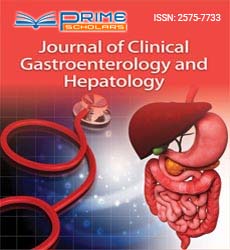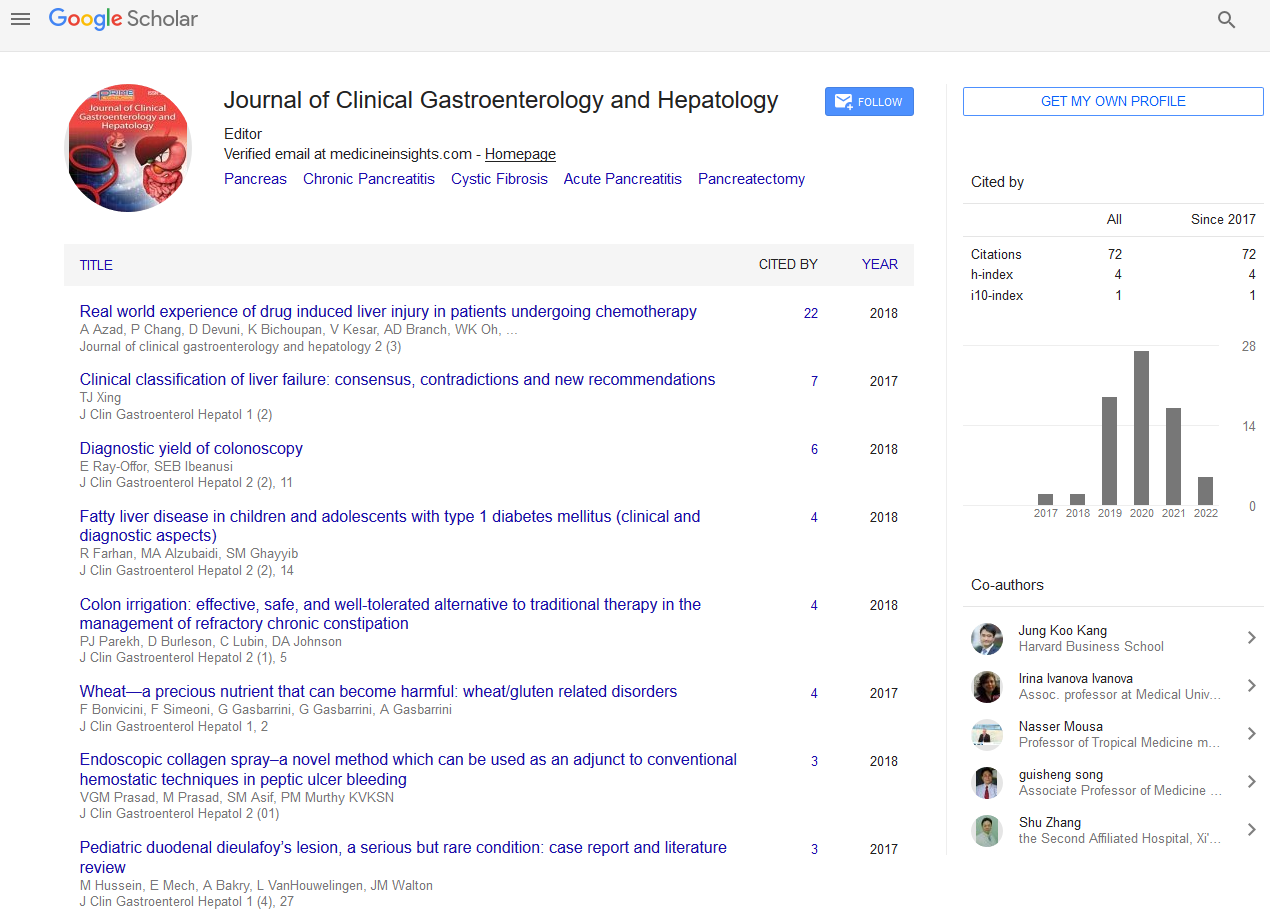Commentary - (2022) Volume 6, Issue 3
Gastroenterology and its Detailed Study of its Application
Department of Gastroenterology, Loma Linda Universitywilliams_ j@gmail.com, USA
*Correspondence:
Jacob Williams, Department of Gastroenterology, Loma Linda Universitywilliams_ j@gmail.com,
USA,
Email:
Received: 01-Mar-2022, Manuscript No. IPJCGH-22-13187;
Editor assigned: 03-Mar-2022, Pre QC No. IPJCGH-22-13187 (PQ);
Reviewed: 17-Mar-2022, QC No. IPJCGH-22-13187;
Revised: 22-Mar-2022, Manuscript No. IPJCGH-22-13187 (R);
Published:
29-Mar-2022, DOI: 10.36648/2575-7733.6.3.12
Description
The study of the normal capacity and sicknesses of the throat,
stomach, small digestive tract, colon and rectum, pancreas,
gallbladder, bile conduits, and liver is known as gastroenterology.
It entails a detailed understanding of the gastrointestinal
organs’ normal activity (physiology), which includes the movement
of food through the stomach and digestive tract (motility),
the processing and retention of supplements in the body,
the expulsion of waste from the framework, and the liver’s capacity
as a stomach-related organ. Colon polyps and malignant
development, hepatitis, gastroesophageal reflux (indigestion),
peptic ulcer disease, colitis, gallbladder and biliary tract infection,
dietary difficulties, Irritable Bowel Syndrome (IBS), and
pancreatitis are all included. Fundamentally, all regular actions
and illnesses of the stomach and adjacent organs are required
for Gastroenterology research.
Gastroenterology is the study of the normal function and diseases
of the pharynx, stomach, small digestive system, colon
and rectum, pancreas, gallbladder, bile ducts, and liver, according
to the American College of Gastroenterology. To maintain
a solid assimilation, retention of supplements, expulsion of
waste, and metabolic cycles, a gastroenterologist must have a
thorough understanding of the normal physiology of all of the
previously mentioned organs, as well as motility through the
digestion tracts and gastrointestinal parcel.
Gastroenterologists are doctors who specialise in analysing and
treating gastrointestinal problems. If your primary care physician
notices a problem with your GI tract, they will almost certainly
refer you to a gastroenterologist for a more thorough examination.
Gastroenterologists use endoscopic procedures to
examine the gastrointestinal tract and make a diagnosis. They
don’t do medical procedures; however they may collaborate
closely with a GI specialist on occasion. They primarily work in
hospitals or medical clinics.
Gastroenterologists specialise in gastrointestinal problems
such as IBS, ulcers, polyps, and acid reflux. These experts have
3 years of clinical school under their belts, as well as 5 to 6
years of further training. They don’t undertake medical procedures
on a regular basis, but they do use endoscopic systems
to diagnose and treat a variety of GI issues. If your primary care
physician notices anything isn’t quite right with your absorption,
if you have stomach pain, or if certain blood tests show
elevated levels, your primary care physician will almost certainly
refer you to a gastroenterologist. Gastroenterologists are
doctors who specialise in analysing and treating problems with
the gastrointestinal (GI) tract and the liver. These experts also
perform common procedures such as colonoscopies, which examine
the inside of your colon. Following clinical school, they
receive 5-6 years of specialised training.
Progressed endoscopy, also known as interventional endoscopy
or cautious endoscopy, is a gastroenterology subspecialty
that focuses on cutting-edge endoscopic procedures for the
treatment of pancreatic, hepatobiliary, and gastrointestinal infection.
Endoscopic retrograde cholangiopancreatography, endoscopic
ultrasound-directed symptomatic and interventional
strategies, and advanced resection procedures such as endoscopic
mucosal resection and endoscopic submucosal analyzation
are just a few of the cutting-edge endoscopic methods that
interventional gastroenterologists are trained in. Furthermore,
several high-level endoscopists perform the presentation of
endoscopic bariatric methods.
Acknowledgement
None.
Conflict of Interest
Authors declare no conflict of interest.
Citation: Williams J (2022) Gastroenterology and its Detailed Study of its Application. J Clin Gastroenterol Hepatol. 6:12.
Copyright: © Williams J. This is an open-access article distributed under the terms of the Creative Commons Attribution License, which permits unrestricted use, distribution, and reproduction in any medium, provided the original author and source are credited.

